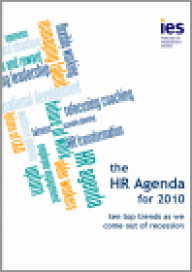Publications
 We author and publish a range of resources to keep you up to date with the latest developments in employment, labour market and human resource policy and practice.
We author and publish a range of resources to keep you up to date with the latest developments in employment, labour market and human resource policy and practice.
All our pdf publications are free to access.
Search results
-

SET Based Technicians
Lessons from the UK and European Labour Force Surveys
Jagger N, Sigala M, Sumption F | Jun 2010 | Institute for Employment StudiesThe aim of this study was to explore the supply of, and demand for, technician level Science, Engineering and Technology (SET) underpinning skills within the UK. This report was based on the analysis of the UK Labour Force Survey (LFS) and the linked European Labour Force Survey (ELFS) both of which provided a range of detailed labour market information.
-

Should I Stay, or Should I Go?
Older employees' later life planning in a business context
Strebler M, Baldwin S | May 2010 | Institute for Employment StudiesHelping older employees plan their future is challenging at the best of times. In an economic downturn these challenges are even greater. This report explores case study research gathered from a broad range of organisations. We focussed on how - and whether - older employees proactively planned their future working life and retirement; what support their employer provided and what sort of conversations they were having and with whom.
-

The Brighton Factor Revisited
Does it work and is it important?
Pollard E, Hunt W, Sumption F, Cowling M, Millmore B | May 2010 | Institute for Employment StudiesThis second stage of the Brighton Factor research explored whether University of Sussex graduates’ expectations were met, how early careers developed in the local labour market, the factors that helped and hindered careers, and whether the city of Brighton and Hove continued to influence their decisions about where to live and work.
-
📄
European Restructuring Monitor Quarterly - 2010, Issue 1
Hurley J, Riso S, Salvatore L, Billingham D, Schulze-Marmeling S, Broughton A | May 2010 | European Monitoring Centre on ChangeThough no longer in recession, the EU economy remained fragile, with growth well below trend rates. Unemployment continued to rise, though at a slowing pace (it stood at 9.6% in the EU27 in February 2010).
-
📄
Learning from the downturn - An employer perspective
Chubb C, Reilly P | Mar 2010 | Institute for Employment StudiesThe aims of the research were: to see whether organisations were responding to economic problems differently than in the past; and if so, to consider why they were adopting these strategies; to assess how well the strategies had worked; and to consider whether such initiatives might have longer term beneficial impacts, not just on the bottom line but on factors such as employee engagement and workforce flexibility.
-

Implementing Shared Professionals
An evolving guide
Reilly P, Fairhurst P | Feb 2010 | Capital AmbitionThis guide is intended to help local authorities consider whether, and how, they might share professionals or professional services with other organisations. The guide is informed by a series of case studies; a number of which are published on the Capital Ambition website. It is planned to add to the list of case studies as the project progresses and update this guide as new lessons are learned.
-

Flexible forms of work: ‘very atypical’ contractual arrangements
Broughton A, Biletta I, Kullander M | Feb 2010 | European Foundation for the Improvement of Living and Working ConditionsThis report examines the recent evolution of some specific flexible employment contractual arrangements in the EU Member States and Norway. Within the broader category of ‘non-standard forms of work’, the overview focuses on the ‘very atypical’ forms of work, namely: part-time work of fewer than ten hours a week, very short fixed-term contracts, zero hours working, and non-written contracts.
-

The HR Agenda for 2010
Ten top trends as we come out of recession
Garrow V (ed.) | Jan 2010 | Institute for Employment StudiesThe HR team at IES reflected on some of the priorities for organisations as they started to emerge from recession and looked to the future. In these short articles topic leaders provided insights that had emerged from recent consultancy and research practice across the public and private sector.
-

Economic Evaluation of the Small Firms Loan Guarantee (SFLG) Scheme
Cowling M | Jan 2010 | Department for Business, Innovation and SkillsThis research provides a comprehensive assessment of the wider economic impact of SFLG arising from supported businesses being able to access loans that they would otherwise not have received. The impact of SFLG is assessed on a number of business outcomes including employment change, sales change, labour productivity, likelihood to export, and propensity to introduce new products and processes.
-
📄
The Recession
Policy and employer responses
Usher T, Dewson S, Cox A | Nov 2009 | Institute for Employment StudiesThis paper examines the impact of recession on the labour market through three lenses: Firstly, it presents a summary of the key evidence to date on redundancies and employment decline in the UK, with international comparisons, identifying which labour market groups and geographical areas have been most affected. Secondly, it reviews and assesses the government policy response, focused on initiatives to support employment. Thirdly, it reviews employer responses to recession (action which affects current employees, and their plans for the future), and questions the level of employer engagement with government policy.
